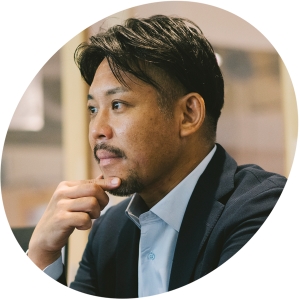Yasuaki Sakyo, Representative Director of NPO Shibuya University and General Incorporated Association Managing Non-Profit, has been involved in Future Design Shibuya since its inception and currently serves as a future designer for Future Design Shibuya. We spoke to Sakyo about what he has been working on so far and what he wants to work on in the future.
Interview and text: Amada Tasuku (Future Design Shibuya)
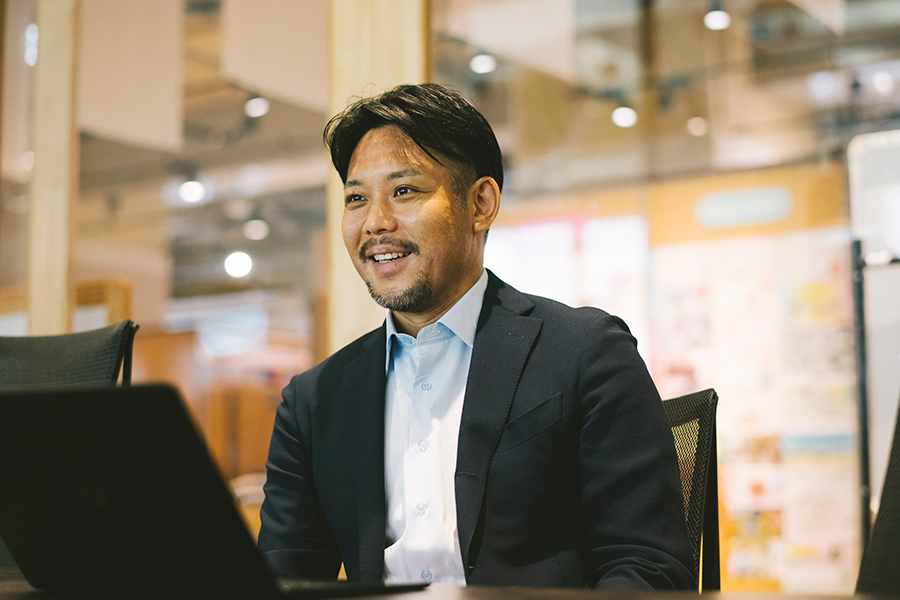
The inside story of a "quirky guy" who left a large company for an NPO
- Please tell us about your activities up to now.
I've been working in Shibuya for a long time now, but before I started working for an NPO in Shibuya, I worked for a trading company. At the time, in the early 2000s, it was the dawn of what was called social business, and I thought the idea of using business methods to solve social issues was very interesting. At that time, there were not many people who made a living from it, and that's why I wanted to try it. At that time, Mr. Hasebe, the current mayor of Shibuya Ward, who was the representative of the NPO "Green Bird," was attracting attention as an advanced practitioner.
In 2005, I left the trading company and became the vice president of Green Bird. At that time, NPOs were still quite rare, and I was even interviewed in magazines and on TV. I had left a large company to join an NPO.
-- So, this interview is to let you know that there are such "eccentrics" out there?
That's right. "Aren't you worried about doing something like that?" I don't think that's the case now, but that was the case back then.
Then, we decided to realize Shibuya University, a new lifelong learning program for Shibuya Ward, which Hasebe had proposed as a ward council member at the time, in the form of an NPO, and I became its leader in 2006.
Shibuya University uses the entire city as a campus, and the concept is lifelong learning where teachers and students learn from each other, including local people. It was a completely different approach from traditional social education projects, but it received a huge response from the first year. This year marks the 18th year of Shibuya University's activities.
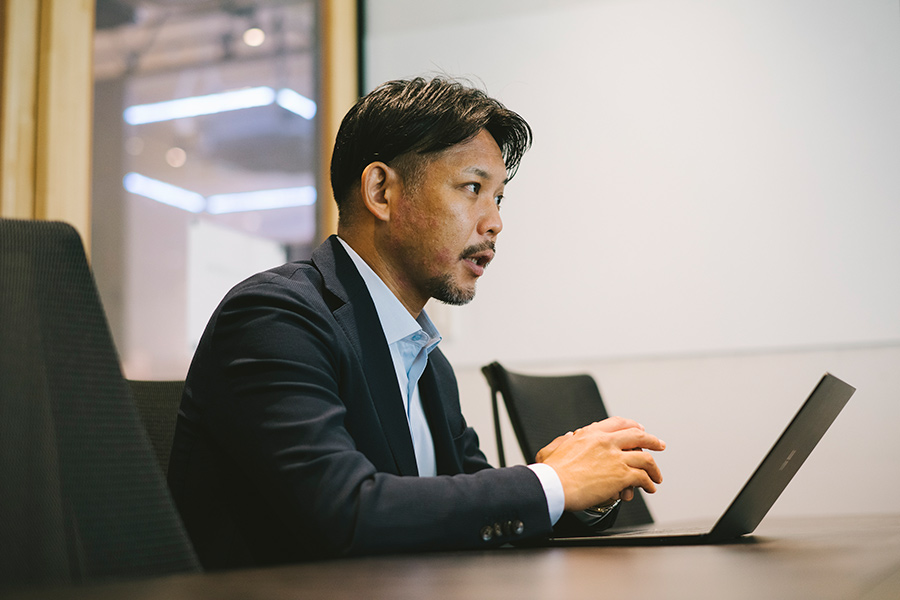
Committed to creating something from nothing in Shibuya
--At the same time, you are also active in the general incorporated association Managing Non-Profit.
I created the organization Managing Non-Profit in 2017. Being involved with various regions through the activities of Shibuya University gives me many opportunities to meet with NPOs working on community activities in each region, and I get to see the problems the region faces. Managing Non-Profit is an organization that supports NPOs working to solve such local issues. It feels like meeting people who are doing fascinating work and putting the thought "I want to help this person" into action.
——Are you often involved in the Shibuya area?
Yes. I do this consciously, and neither Shibuya University nor Managing Nonprofit goes beyond Shibuya. For example, I am often told that Shibuya University's business should be expanded to other cities using Shibuya as a model, but I don't take such action. Even so, businesses like Shibuya University have actually spread to various places all over the country.
For example, I was a member of the Shibuya Ward "Same-Sex Partnership Ordinance" committee, and this ordinance has also spread to other cities, using Shibuya as a precedent. I have repeatedly felt that Shibuya is a city with a strong voice and influence, and that is why we are committed to creating something from scratch in Shibuya, rather than taking our own model to other areas.
I believe that if a solution to an important problem that is relevant to everyone is born in Shibuya, it will naturally spread to other cities.
—— Focus on creating a fire rather than letting it spread.
That's right. I think Shibuya is an area where people have high hopes for that.
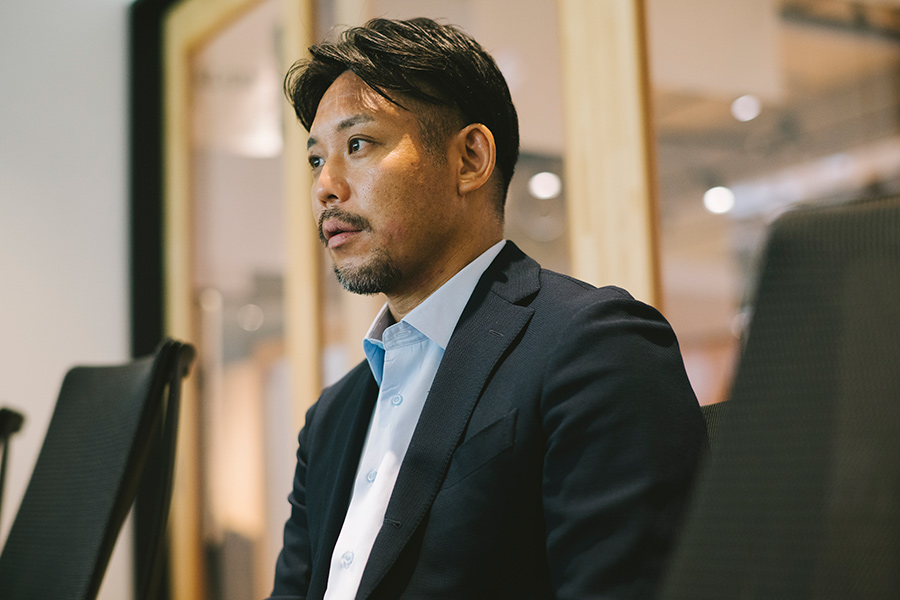
Creating a place for local interaction for people who need connections and a place to belong
——What kind of initiatives have you undertaken as a future designer for Future Design Shibuya?
The project that left the biggest impression on me was the revitalization project for the former Sasazuka Senior Citizens Hall, which we carried out in 2019. It was originally a facility for local elderly people, but it was to be closed due to deterioration, so we tried to reuse it for a short period of time.
For example, the Shibuya Otonari Sunday event, which I was also involved in running, aims to create connections between people in the community through events. This is where communication between local people is born, but at the same time, I have always felt that in order to keep those connections going, it is also necessary to take an approach of creating a "permanent" place rather than an "event-based" one. So this project was a three-month demonstration experiment to open the former Sasazuka Senior Citizens' Hall to the community as a "town living room" and create a place where people can interact with each other on a daily basis.
In the end, it was a huge success, with the place fully booked every day. In the morning, mothers would gather to chat after dropping their children off at kindergarten or nursery school, and after a while the elderly would come and eat together, and in the afternoon, the place would become lively as children would come in droves after kindergarten, nursery school, or elementary school. In the evening, working adults would hold town development workshops... so it became a place where all kinds of people came all day long. Originally, it was a facility that only a few elderly people were able to use, but I feel that we were able to properly visualize this kind of need in the community.
--So, Sakyo, what do you want to work on in the future?
One of the projects we are currently focusing on is an extension of the project at the former Sasazuka Senior Citizens' Hall that I just mentioned. It is a project to create and operate "Sasazuka No. 10 House," a place for local residents to interact, which opened in February of this year.
The central figure in this project is Mr. Todokoro, who was the director of the Sasahata Community Comprehensive Support Center, which means he knows the elderly in the community better than anyone else. The Community Comprehensive Support Center is like a general consultation desk for the elderly in the community, and it receives over 1,000 consultations per month, but there are many cases where support is needed that cannot be handled within the administrative system and rules. For example, administrative support begins when people come to the administrative office for consultation, so it is difficult to hear the voices of people who cannot come that far. So Mr. Todokoro started an NPO to support people who cannot come to the consultation desk. For example, he changes light bulbs, teaches them how to use smartphones, and supports various applications during the COVID-19 period.
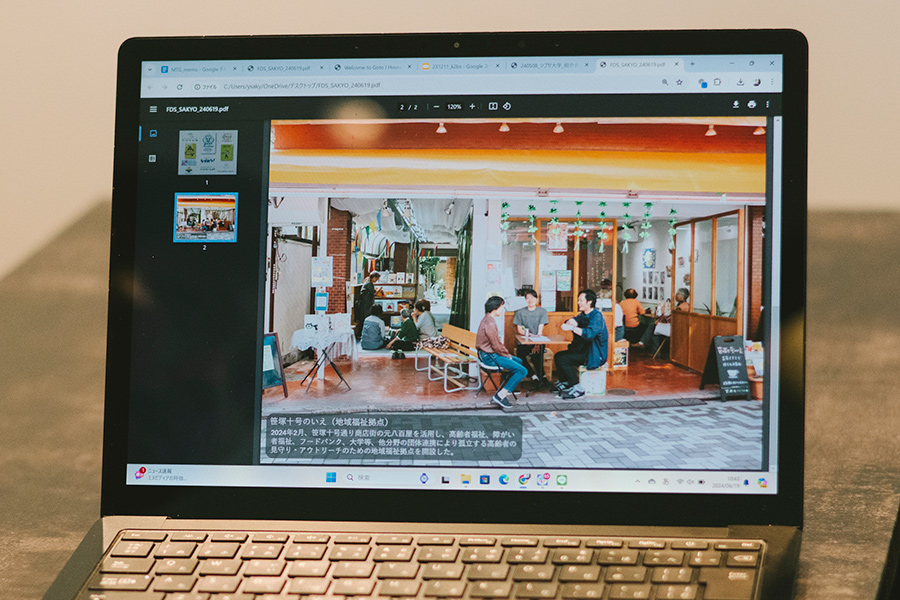
At that time, a greengrocer that was located right in the middle of Sasazuka's Jugo Dori shopping district was closing down, so the "Sasazuka Jugo No Ie" project was launched with the aim of turning the store into a place for interaction, and I ended up helping to run it.
Both Todokoro and I had always wanted to open such a place, but considering the costs, it would be difficult for one NPO to do it on its own.So we gathered 10 other NPOs to help us run it, spread the costs, and conducted crowdfunding, which led to the opening in February of this year.
It was the same at the old Sasazuka Senior Citizens' Hall, but when you have a place like this, all kinds of people just drop in. Among them are many elderly people who live alone and rarely talk to anyone. The issue of isolation and loneliness among the elderly is very important, as are people with disabilities, children who have nowhere to go, and mothers who feel isolated while raising their children. I want to continue creating a place for such people.
If that happens, I think it could become a spark that will spread from Shibuya as a regional model.
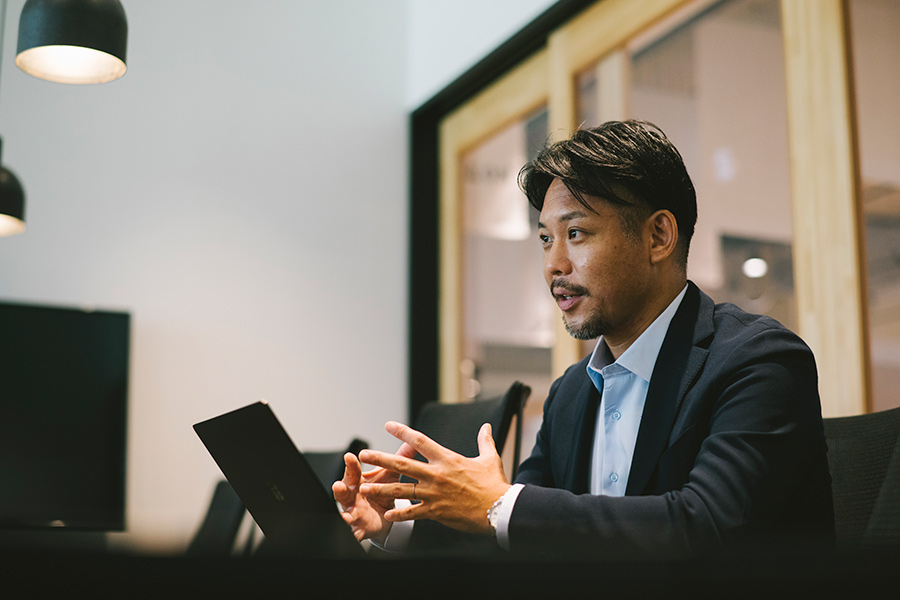
The job of helping people who help others
-- Sakyo-san, how do you go about finding those sparks, that is, local issues, and finding solutions to them?
Rather than discovering it myself, it feels like someone has already found it, and I empathize with that person's mission and work on it together. So, I'm not an expert on elderly welfare, or disabled welfare, or in childcare support, but there are always people who are trying to do something in each field. I first meet those people. Then, I understand the challenges they are facing, empathize with their passion, and decide to work together.
I think my role is to "help people who help others." There are a lot of people who help others. There are a lot of people who do it with enthusiasm and passion that I could never match. But even those who do that kind of activity also have things they're not good at. For example, while the quality of their elderly support is extremely high, they may actually be bad at running the organization or have management issues. But on the contrary, I'm interested in that. I'm interested in how to balance such social activities with management, so the puzzle of the division of roles fits perfectly.
--You also really convey your respect for the people who are working passionately to solve these problems.
I feel that way a lot. I have respect for them, and although it's hard to explain, I feel like I want them to be happy.
I hope that everyone will feel rewarded and be able to work for a long time, and that others will follow suit and take root and spread, but in reality, it often doesn't work out that way. After all, the people who take the initiative to start such social activities are often people who have a strong passion to do it even at the risk of their own safety... or to sacrifice themselves. But if that's all there is, things won't go well, and it's a job that only one person can do, so the number of people who can be helped is limited. That's why we need more people to provide support, and to do that, we need more money. I think it's my role to solve such problems.
--If there were more people like you, Sakyo, society would change even more.
That's right. I think there are quite a lot of people, especially those working in the business sector, who want to support people who are working on some issue with a strong passion. I'm sure there is a need for people who want to do that kind of work, but the current situation is that the system has not yet been fully established. So that's one of the things I want to work on in the future.



